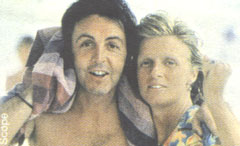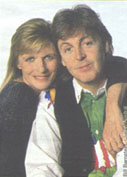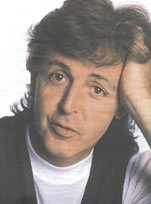So why isn't he better regarded? True, his post-Beatles band, Wings, was a bit of an embarrassment. And I can't help wondering how much greater his reputation would be if it had been Macca not Lennon who was shot outside the Dakota buildings 20 years ago.
We should all be glad McCartney is still with us. While other rockers develop mid-Atlantic drawls and accumulate wacky therapists, McCartney remains as British as Big Ben. In England, he's a national treasure.
The foyer of his London office, where I await his arrival, is decorated with two photographs; both of the world's most famous singer-songwriter on the world's most famous pedestrian crossing (Abbey Road). But as an exercise in contrasts the photographs - taken 30 years apart (one has an early Beetle in the background, the other a swanky modern Merc) - fail. Despite the passing in time, McCartney looks identical. The years seem not to touch him.
This impression is confirmed when we meet. The idol wears sandals, smart grey trousers and an open neck shirt; if he wasn't so famous you might think he was a dotcom whiz. Then he smiles and his look is both wicked and innocent; an expression that reduced a generation of girls to adoring tears.
"Glass of iced water please, girls," he shouts to his two secretaries. His days of excess may be behind him but his work continues. He has dabbled in classical music; he confides that he is to publish his first volume of poetry; but the reason for this meeting is to discuss his latest career - as a painter.
Never have I met a man more excited by the newness of things (he ponders aloud whether "I might even marry again"). Yet he is also a man who had lost nights dreaming of the past, of both Lennon and his late wife, Linda - when I mention her his eyes fill with tears. He tells me he "drives" himself forward, but he can not resist glancing back to yesterday: recently, he says, he embarked on a secret mission to revisit the maharishi, evoking memories of the band's controversial pilgrimage more than 30 years ago.
I thought he might be a bit worthy and bang on about vegetables and Liverpool. Instead, I found him intoxicated by fun and full of what he calls his "outrageous dreams". He is also a fantastic mimic, delighting in deflating pretension. One of his paintings is called "The Queen After Her First Cigarette" - a close likeness of Her Majesty wearing the naughtiest of smirks.
Will the picture offend her? "I don't know if she will like it, I don't care really. It is affectionate, it is not meant to be anti-royalist." Sir Edward Heath, Patti Boyd and Andy Warhol are also featured. "It's just a little joke," he twinkles. He has been a little more careful with his fellow rocker, David Bowie, who is depicted in another painting throwing up: "I thought I had better warn him about that before the press got hold of it." He may paint at Magritte's easel (a gift from Linda) but he is modest about his art. "I am doing it for pleasure, I'm not doing it for a living," he says, fondling his earlobe and looking relaxed about his exhibition, which is about to open in Bristol.
 Still, he must be worried that the art will be judged a failure against his music. "I do get traumas about art, he admits. "People like me aren't allowed to be artists. But then I tell myself not to be a silly sod. I have developed a bunch of tricks. One is to tell myself that I am doing a painting for my friend Luigi, for an alcove in his restaurant." His paintings reveal a lot (particularly a miserable self portrait). "Yeah, sometimes I look at my paintings like a hard critic and think, 'I am too open, I show what is in my mind'. Linda asked me, 'Why do you want to exhibit?' The answer is that people will wonder what I have been up to all these years. I also thought it wouldn't be bad to get some feedback."
Still, he must be worried that the art will be judged a failure against his music. "I do get traumas about art, he admits. "People like me aren't allowed to be artists. But then I tell myself not to be a silly sod. I have developed a bunch of tricks. One is to tell myself that I am doing a painting for my friend Luigi, for an alcove in his restaurant." His paintings reveal a lot (particularly a miserable self portrait). "Yeah, sometimes I look at my paintings like a hard critic and think, 'I am too open, I show what is in my mind'. Linda asked me, 'Why do you want to exhibit?' The answer is that people will wonder what I have been up to all these years. I also thought it wouldn't be bad to get some feedback."
It will need to be more than meritorious to stop the sneers. "I know. But my personality is to risk all. That's why I went into classical music. I don't want to remain just a pop artist. I get interested in things. That's my problem."
He claims that the young wife of a painter friend was "killed" by her husband's bad reviews. "The reviews are why he doesn't live in England any more. I know it will happen to me and I know it will hurt, but it's not going to kill me." Has he ever felt like escaping England? "God, the people and the weather... ", he trails off. "I'm used to it. We are rooted here."
Unlike your average rock superstar, he sent his children (including the fashion designer Stella) to British state schools. Mick Jagger's daughter Jade recently remarked that she envied their ordinary upbringing.
"Linda came from a wealthy family, she saw a lot of false lives," explains McCartney. "I used to say, 'You are just slumming it with me, aren't you? You just see me as a bit of rough trade.' She used to say that she had gone into lots of big houses in the Hamptons, where there was lots of money, but it was terrifying, there was no love there, kids walking around in echoing corridors with priceless sculptures."
But his kids must still have been teased? "Oh yeah, sure. They got stick about "Mull Of Kintyre". But they got it early and learnt to deal with it."
He thinks that if they had gone to a public school they would have been emotionally distant. Bill Gates has fulminated on the difficulty of being a famous parent. "Well, I was pretty famous," McCartney says in a 'so what' manner that suggests he has long lost interest in fame. "We got to know all the mums and we would say, ''Ow's your 'Arry? Oh, he's got jaundice, has he?' It was ordinary, but it was life."
How ordinary can his life - and his children's - have been? Stella might have played with a kid on a council estate, but then went back to the manor house.
 "No, ours is a relatively small house," he insists. "Sometimes I go to a friend's and think, 'Wow, I've got a rich mate.' They like to live like that, but I wouldn't. On the whole our kids - and they will moan at me for saying this because they hate dad talking about them - are very level headed. Linda and I said that we wouldn't push them educationally, because we were both pushed and went in other directions. As long as they have good hearts."
"No, ours is a relatively small house," he insists. "Sometimes I go to a friend's and think, 'Wow, I've got a rich mate.' They like to live like that, but I wouldn't. On the whole our kids - and they will moan at me for saying this because they hate dad talking about them - are very level headed. Linda and I said that we wouldn't push them educationally, because we were both pushed and went in other directions. As long as they have good hearts."
McCartney is probably a little guilty of hamming up his blokeishness, with talk of bevvies and birds, but even a mannered modesty is preferable to pretentious preening.
"I still go on the Underground. Nobody goes on the Underground. Not even normal people. I was on the Metro in Paris and people were looking at me, but I blanked them and after a while they assumed it coulnd't be me."
Taking pleasure from proletarian pursuits does not signify a belief in equality so much as a yearning for company and discovery. "I used to travel on a bus in Liverpool with a pipe - how pretentious can you get? I thought I was Dylan Thomas."
With mention of Thomas, I ask if he ever had ambitions to be a poet. After all, Lennon-McCartney lyrics were at least the equal of the Mersey Beat Poets.
His eyes dart to his resident public relations guru. "Can I talk about this?" The mood is friendly, so without answer he points to his desk. "There is the manuscript," he says. "I am trying to write a poetry book. Allen Ginsberg admired "Eleanor Rigby" and he's no slouch. But as well as the lyrics I am trying to write some real poems. I don't want to be a Renaissance man," he continues and laughs at himself. "I started writing poetry when a friend, Ivan Vaughn, died. I couldn't write a song about somebody dying, so I just started on this poem. It was a farewell and it went from there."
Is there not a danger of spreading himself too thin? "They can all co-exist. The British tend to compartmentalise. Leonardo da Vinci finished his career as a court musician so maybe I could end as a painter."
For the only time during the interview, McCartney looked appalled. "Paul McCartney reckons he is Leonardo da Vinci," he says, imagining the headline. "You had better not put that in." I promise to make it clear that he made his comparison with a "wry smile". "Yeah and your editor will take out the 'wry smile'," he says blithely.
Despite the bonhomie, there seems to be a sadness about him. "Yes, there is a lot of sadness in my life," he says slowly. "My mother died when I was 14. Three years on I was up and running in the Beatles. I have probably suppressed quite a lot. As a young guy in Liverpool, I'm not going to go around blubbering am I? It was actually one of my great bonds with John, because his mum died when he was 16. Both of us had mothers snatched from us and we both loved them dearly. A lot is repressed. "Yesterday" was probably about that, you know, 'Yesterday, all my troubles seemed so far away'". There is a long pause. "You don't really want to cry in public," he says, looking very much as though he might.
He expresses his grief through music ("sometimes I can feel really blue and pour it out on my guitar") and painting. He painted Linda when she was healthy, when she was ill and since her death two years ago. He still aches for her.
 "I did a lot of portraits, none of which capture her but all of which captured a certain essence. She had a great face to paint, long neck, gorgeous. We often used to sit late at night and I would paint her. The one I have done since she died..." He fades out.
"I did a lot of portraits, none of which capture her but all of which captured a certain essence. She had a great face to paint, long neck, gorgeous. We often used to sit late at night and I would paint her. The one I have done since she died..." He fades out.
 We are still trying to get to grips with it, 30 years is a lot to get over. She was a very powerful person in a very quiet way - very impressive. I talk to my kids and they say what they miss is just coming into a room and feeling her presence. You are going to make me cry now," he says, dabbing his eyes. "I'm sorry I've gone off... What were we talking about?"
We are still trying to get to grips with it, 30 years is a lot to get over. She was a very powerful person in a very quiet way - very impressive. I talk to my kids and they say what they miss is just coming into a room and feeling her presence. You are going to make me cry now," he says, dabbing his eyes. "I'm sorry I've gone off... What were we talking about?"
"Painting for me now is trying to get to grips with what life becomes when you lose someone like that. The paintings I have done of Linda now - they are pretty turbulent. A bit stark."
Having lost a wife would be enough to send most of us sobbing under a blanket, I tell him. "Yep, been there. Sure, it's tempting," he reflects. But then you just find yourself under a blanket. I know what you mean. The first year, that was the big question: how is this going to go? But I talked to my mates about it. She was such a positive spirit. She would want us all to get on with it."
McCartney says he is "very into" his new relationship with Heather Mills, who lost her leg in a road accident. He met Mills at a bravery awards ceremony and their romance became public in March.
"She's a great girl, you know," he says. "And I have to talk to Linda about that. You know, 'What am I doing babe? How d'you feel about this?' And what she says is, 'If I was there you'd be dead meat, sucker. But I'm not there and I want you to be happy'. That's the feeling I get back. I know they'd like each other because they have a lot of things in common, not on the surface so much. A spirit, a toughness of spirit."
Getting on with it also seems to mean work. "I do have a work ethic. I even show up in the office occasionally!" As well as writing the score for an animated film, he has even considered becoming a stand-up comic, though rock remains his passion.
He defends his less successful endeavours. "Maybe you are right, maybe I should have been more protective of my reputation. I live with that. But one of these young musicians, I forget who, said on TV the other day, 'Dear Paul, what were you on when you wrote that Rupert and the Frog song - because I would like some of it?' We only have so much time - this time round, anyway - so we might as well make the most of it. The maharishi said to us 'enjoy', which was before it became a cliche like 'have a nice day'."
He returned to his old guru recently with two of his children. The maharishi had foregone India for Maastricht ("talk about being at the centre of action"). "He was lovely. He was in his 80s and I was told he might not want to chat much. We ended up chatting for four hours. My daughter then got out her video and asked what his advice was. He said, 'enjoy'. Which is at least consistent."
Not that he has been doing much enjoying of late. As well as grieving for Linda, her death seems to have revived memories both of his mother ("she used to tell me off for talking like a scruff, which I hated, but now I love. She aspired for us") and of Lennon. Talking about Lennon is the big taboo in a McCartney interview and I was warned off it beforehand. But Sir Paul seems anxious to talk.
"John and I wrote before there were cassette players. Can you believe it was that long ago? We would often forget the songs the next day. John is a central figure in my life, always will be. I will always be grateful for having so much intimate time with him. If you are a Lennon fan, I was one of the luckiest people alive. The more distant his stuff becomes the more great it seems." McCartney is rather in awe of Lennon. He resisted exhibiting his own art because, unlike Lennon, he had not been to art school.
"I used to do caricatures of John, he was the only person I knew with an aquiline nose. When I painted him recently, I found myself saying, 'How did his lips go, I can't remember?' then I would think, 'Of course you know, you wrote all those songs facing each other'."
Such a sociable man can not spend the rest of his life mourning those he has lost. Might he marry again?
"A leading question. You never know. I have no plans, but life develops and I might. I feel better than I have felt for a couple of years, but what they don't tell you is that time heals by erasing, In one respect I want to be as close to Linda as when she was alive; but the healing aspect is another thing. You do eventually have to say, 'This is the brief'. All our relatives will die, we will die. And you know, you've just got to get on with it."
 I STILL BELIEVE IN YESTERDAY
I STILL BELIEVE IN YESTERDAY